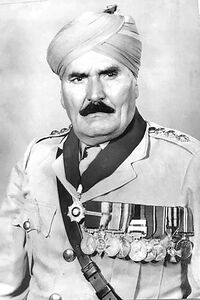Honorary Captain Sardara

Sardara was from Majra (Dubaldhan) village in Jhajjar district of Haryana, India. He joined 6 Jat Light Infantry in 1911. He served as Lance Naik in World War I.
His role in World War I
One Juglal and Sardara belonged to Majra (Dubaldhan) village in present-day Jhajjar district of Haryana. Juglal, the elder, got enlisted in 6 Jat Light Infantry in 1906, followed by his five years younger Sardara in 1911. During World War I, both served in the same company; the elder as Pay Havildar and the younger as Lance Naik.
6 Jat light Infantry was raised as 1st Battalion, 22nd Regiment of Bengal Native Infantry in 1803. The designation kept changing; in 1901, it became 6 Jat Light Infantry and retained the designation till 1921. In 1950, it became 1st Battalion (LI), The Jat Regiment. During mechanisation of infantry regiments in 1970, it was designated as 2nd Mechanised Battalion and remains as such.
On December 5, 1915, 6 Jat LI sailed from Suez, disembarked at Basra and formed part of 19th Brigade along with 2nd Black Watch Infantry. On January 20, 1916, a mixed force of 62 all ranks was formed for a limited offensive task. Hav Juglal, Naik Bakhtawar and Sepoy Bharat Singh, all from Majra, were among the six other ranks from the battalion in the mixed force. The force was to capture a Turkish position on the right bank of Wadi River, a tributary of Tigris River in Mesopotamia (Iraq), and enter the trench.
The attack began at 7.45 am on 21st and after an hour’s fierce fight, the Turks were overpowered. An hour later, the Turks counter-attacked in overwhelming strength. The battle resulted in many dead and wounded. The news of the calamity spread fast. Sardara, though in another platoon, ran to the Medical Aid Post (MAP) where he was told by Capt Wells, the officiating Commanding Officer, that due to sporadic fire from the Turks, the casualties had not yet been evacuated.
Sardara sought permission to go forward to bring back his brother. The officer apprised him that the entire section strength of the battalion appeared to have been wiped out. Sardara had not come to hear that. After garnering information about the area, he dashed towards the trench under whatever cover available; apparently, the attackers had moved over to another section of the trench. During the frantic search, Sardara found Juglal with bayonet wounds, just about alive. The elder looked at his younger, smiled and breathed his last.
Just then he heard someone call ‘Sardare’. He found Bakhtawar and Bharat Singh lying grievously wounded, Bharat being more serious. By then the Turkish fire had almost died down.
External links
Author
Lt Col Dilbag Singh Dabas (Retd)

